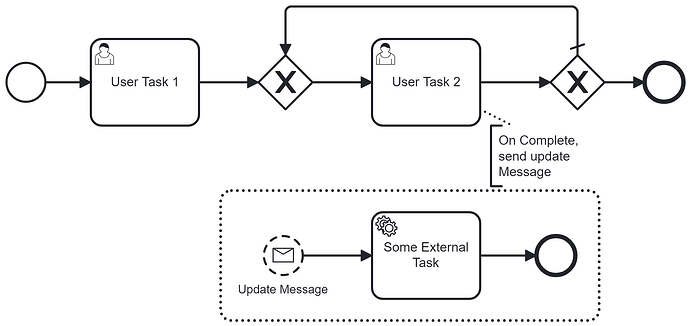What i want to achieve:
On completion of a user task, a service task (external task) is invoked.
My solution looks like this:
User Task 2 has the following task listener:
<camunda:taskListener event="complete">
<camunda:script scriptFormat="javascript">task.getProcessEngineServices().getRuntimeService().correlateMessage("update", businessKey, new Map([["data","someData"]]));</camunda:script>
</camunda:taskListener>
So the event subprocess is started on completion of User Task 2.
The Problem:
To test, i use the REST API to get and complete user task 2 over and over:
### Get Task 2
GET localhost:8080/engine-rest/task?processInstanceId={{instanceId}}
### Complete Task2
POST localhost:8080/engine-rest/task/{{taskId}}/complete
Content-Type: application/json
{}
At some point, seemingly at random, the completion fails due to this Error:
2023-03-16 10:21:18.376 WARN 12512 --- [nio-8080-exec-1] org.camunda.bpm.engine.rest.exception : ENGINE-REST-HTTP500 org.camunda.bpm.engine.rest.exception.RestException: Cannot complete task e846ee28-c3db-11ed-9e38-2e0da7043a58: ENGINE-03005 Execution of 'UPDATE ExecutionEntity[e5e04e8b-c3db-11ed-9e38-2e0da7043a58]' failed. Entity was updated by another transaction concurrently.
at org.camunda.bpm.engine.rest.sub.task.impl.TaskResourceImpl.complete(TaskResourceImpl.java:134)
at jdk.internal.reflect.GeneratedMethodAccessor359.invoke(Unknown Source)
at java.base/jdk.internal.reflect.DelegatingMethodAccessorImpl.invoke(DelegatingMethodAccessorImpl.java:43)
at java.base/java.lang.reflect.Method.invoke(Method.java:568)
at org.glassfish.jersey.server.model.internal.ResourceMethodInvocationHandlerFactory.lambda$static$0(ResourceMethodInvocationHandlerFactory.java:52)
at org.glassfish.jersey.server.model.internal.AbstractJavaResourceMethodDispatcher$1.run(AbstractJavaResourceMethodDispatcher.java:124)
at org.glassfish.jersey.server.model.internal.AbstractJavaResourceMethodDispatcher.invoke(AbstractJavaResourceMethodDispatcher.java:167)
at org.glassfish.jersey.server.model.internal.JavaResourceMethodDispatcherProvider$ResponseOutInvoker.doDispatch(JavaResourceMethodDispatcherProvider.java:176)
at org.glassfish.jersey.server.model.internal.AbstractJavaResourceMethodDispatcher.dispatch(AbstractJavaResourceMethodDispatcher.java:79)
at org.glassfish.jersey.server.model.ResourceMethodInvoker.invoke(ResourceMethodInvoker.java:475)
at org.glassfish.jersey.server.model.ResourceMethodInvoker.apply(ResourceMethodInvoker.java:397)
at org.glassfish.jersey.server.model.ResourceMethodInvoker.apply(ResourceMethodInvoker.java:81)
at org.glassfish.jersey.server.ServerRuntime$1.run(ServerRuntime.java:255)
at org.glassfish.jersey.internal.Errors$1.call(Errors.java:248)
at org.glassfish.jersey.internal.Errors$1.call(Errors.java:244)
at org.glassfish.jersey.internal.Errors.process(Errors.java:292)
at org.glassfish.jersey.internal.Errors.process(Errors.java:274)
at org.glassfish.jersey.internal.Errors.process(Errors.java:244)
at org.glassfish.jersey.process.internal.RequestScope.runInScope(RequestScope.java:265)
at org.glassfish.jersey.server.ServerRuntime.process(ServerRuntime.java:234)
at org.glassfish.jersey.server.ApplicationHandler.handle(ApplicationHandler.java:684)
at org.glassfish.jersey.servlet.WebComponent.serviceImpl(WebComponent.java:394)
at org.glassfish.jersey.servlet.WebComponent.service(WebComponent.java:346)
at org.glassfish.jersey.servlet.ServletContainer.service(ServletContainer.java:366)
at org.glassfish.jersey.servlet.ServletContainer.service(ServletContainer.java:319)
at org.glassfish.jersey.servlet.ServletContainer.service(ServletContainer.java:205)
at org.apache.catalina.core.ApplicationFilterChain.internalDoFilter(ApplicationFilterChain.java:227)
at org.apache.catalina.core.ApplicationFilterChain.doFilter(ApplicationFilterChain.java:162)
at org.apache.tomcat.websocket.server.WsFilter.doFilter(WsFilter.java:53)
at org.apache.catalina.core.ApplicationFilterChain.internalDoFilter(ApplicationFilterChain.java:189)
at org.apache.catalina.core.ApplicationFilterChain.doFilter(ApplicationFilterChain.java:162)
at org.camunda.bpm.engine.rest.filter.CacheControlFilter.doFilter(CacheControlFilter.java:45)
at org.apache.catalina.core.ApplicationFilterChain.internalDoFilter(ApplicationFilterChain.java:189)
at org.apache.catalina.core.ApplicationFilterChain.doFilter(ApplicationFilterChain.java:162)
at org.camunda.bpm.engine.rest.filter.EmptyBodyFilter.doFilter(EmptyBodyFilter.java:99)
at org.apache.catalina.core.ApplicationFilterChain.internalDoFilter(ApplicationFilterChain.java:189)
at org.apache.catalina.core.ApplicationFilterChain.doFilter(ApplicationFilterChain.java:162)
at org.springframework.web.filter.RequestContextFilter.doFilterInternal(RequestContextFilter.java:100)
at org.springframework.web.filter.OncePerRequestFilter.doFilter(OncePerRequestFilter.java:117)
at org.apache.catalina.core.ApplicationFilterChain.internalDoFilter(ApplicationFilterChain.java:189)
at org.apache.catalina.core.ApplicationFilterChain.doFilter(ApplicationFilterChain.java:162)
at org.springframework.web.filter.FormContentFilter.doFilterInternal(FormContentFilter.java:93)
at org.springframework.web.filter.OncePerRequestFilter.doFilter(OncePerRequestFilter.java:117)
at org.apache.catalina.core.ApplicationFilterChain.internalDoFilter(ApplicationFilterChain.java:189)
at org.apache.catalina.core.ApplicationFilterChain.doFilter(ApplicationFilterChain.java:162)
at org.springframework.web.filter.CharacterEncodingFilter.doFilterInternal(CharacterEncodingFilter.java:201)
at org.springframework.web.filter.OncePerRequestFilter.doFilter(OncePerRequestFilter.java:117)
at org.apache.catalina.core.ApplicationFilterChain.internalDoFilter(ApplicationFilterChain.java:189)
at org.apache.catalina.core.ApplicationFilterChain.doFilter(ApplicationFilterChain.java:162)
at org.apache.catalina.core.StandardWrapperValve.invoke(StandardWrapperValve.java:197)
at org.apache.catalina.core.StandardContextValve.invoke(StandardContextValve.java:97)
at org.apache.catalina.authenticator.AuthenticatorBase.invoke(AuthenticatorBase.java:541)
at org.apache.catalina.core.StandardHostValve.invoke(StandardHostValve.java:135)
at org.apache.catalina.valves.ErrorReportValve.invoke(ErrorReportValve.java:92)
at org.apache.catalina.core.StandardEngineValve.invoke(StandardEngineValve.java:78)
at org.apache.catalina.connector.CoyoteAdapter.service(CoyoteAdapter.java:360)
at org.apache.coyote.http11.Http11Processor.service(Http11Processor.java:399)
at org.apache.coyote.AbstractProcessorLight.process(AbstractProcessorLight.java:65)
at org.apache.coyote.AbstractProtocol$ConnectionHandler.process(AbstractProtocol.java:890)
at org.apache.tomcat.util.net.NioEndpoint$SocketProcessor.doRun(NioEndpoint.java:1789)
at org.apache.tomcat.util.net.SocketProcessorBase.run(SocketProcessorBase.java:49)
at org.apache.tomcat.util.threads.ThreadPoolExecutor.runWorker(ThreadPoolExecutor.java:1191)
at org.apache.tomcat.util.threads.ThreadPoolExecutor$Worker.run(ThreadPoolExecutor.java:659)
at org.apache.tomcat.util.threads.TaskThread$WrappingRunnable.run(TaskThread.java:61)
at java.base/java.lang.Thread.run(Thread.java:833)
Caused by: org.camunda.bpm.engine.OptimisticLockingException: ENGINE-03005 Execution of 'UPDATE ExecutionEntity[e5e04e8b-c3db-11ed-9e38-2e0da7043a58]' failed. Entity was updated by another transaction concurrently.
at org.camunda.bpm.engine.impl.db.EnginePersistenceLogger.concurrentUpdateDbEntityException(EnginePersistenceLogger.java:141)
at org.camunda.bpm.engine.impl.db.entitymanager.DbEntityManager.handleConcurrentModification(DbEntityManager.java:413)
at org.camunda.bpm.engine.impl.db.entitymanager.DbEntityManager.flushDbOperations(DbEntityManager.java:356)
at org.camunda.bpm.engine.impl.db.entitymanager.DbEntityManager.flushDbOperationManager(DbEntityManager.java:323)
at org.camunda.bpm.engine.impl.db.entitymanager.DbEntityManager.flush(DbEntityManager.java:295)
at org.camunda.bpm.engine.impl.interceptor.CommandContext.flushSessions(CommandContext.java:272)
at org.camunda.bpm.engine.impl.interceptor.CommandContext.close(CommandContext.java:188)
at org.camunda.bpm.engine.impl.interceptor.CommandContextInterceptor.execute(CommandContextInterceptor.java:119)
at org.camunda.bpm.engine.spring.SpringTransactionInterceptor.lambda$execute$0(SpringTransactionInterceptor.java:71)
at org.springframework.transaction.support.TransactionTemplate.execute(TransactionTemplate.java:140)
at org.camunda.bpm.engine.spring.SpringTransactionInterceptor.execute(SpringTransactionInterceptor.java:71)
at org.camunda.bpm.engine.impl.interceptor.ProcessApplicationContextInterceptor.execute(ProcessApplicationContextInterceptor.java:70)
at org.camunda.bpm.engine.impl.interceptor.CommandCounterInterceptor.execute(CommandCounterInterceptor.java:35)
at org.camunda.bpm.engine.impl.interceptor.LogInterceptor.execute(LogInterceptor.java:33)
at org.camunda.bpm.engine.impl.interceptor.ExceptionCodeInterceptor.execute(ExceptionCodeInterceptor.java:55)
at org.camunda.bpm.engine.impl.TaskServiceImpl.complete(TaskServiceImpl.java:179)
at org.camunda.bpm.engine.rest.sub.task.impl.TaskResourceImpl.complete(TaskResourceImpl.java:117)
... 64 more
